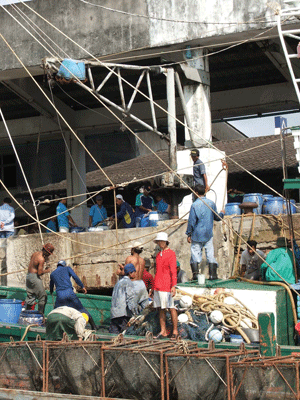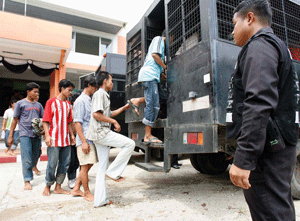A Dangerous, Difficult Life
The tragic deaths of 54 Burmese migrant workers highlight once again the hazards of working illegally abroad
THERE were 10 men lying beside me in the back of a pickup truck. Our bodies were covered with a thick plastic sheet and it was extremely hot. I couldn’t see a thing. I could only hear the sound of cars and trucks going by,” recalled Yan Naing Htun, a migrant worker who came to Thailand from Burma eight years ago, when he was just 10 years old.
Yan Naing Htun said he left the Burmese border town of Myawaddy after his father, who raised him and his sister alone, died of malaria. Accompanied by a close friend of his father, he made the journey to Bangkok because he had no way to support himself in Burma.
 |
| Burmese migrant workers take the lowest paying and most dangerous jobs in Thailand. (Photo: The Irrawaddy) |
He still vividly remembers the terror he felt when he was smuggled into Thailand—the most popular destination for the millions of Burmese who are forced to look abroad for some means of making a living. “I was so afraid of being arrested that I tried to stay perfectly still under the plastic sheet,” he said.
Even after completing his journey, Yan Naing Htun soon learned that in Thailand there are few safe places for an illegal immigrant. Mahachai may be home to tens of thousands of Burmese workers, but there is little safety in numbers, as they are still vulnerable to gangs, harassment by police and workplace exploitation.
But that doesn’t prevent a constant influx of Burmese workers into the area. According to Somporn Sakaew, the director of the Mahachai-based Labor Rights Promotion Network, about 100 Burmese, including children, sneak into Mahachai every night to find jobs. “They take so many risks to come and work in Thailand,” he said.
 |
| Burmese migrant workers are frequently rounded up and deported. (Photo: Reuters) |
Yan Naing Htun could be considered lucky. He makes enough money to send part of his income back to Burma to help support his sister and her family. His biggest regret is that he never received an education—he cannot read or write, even in his native Mon language.
“I always dreamed of going to school, but when I consider my age, I feel ashamed,” the slightly built 18-year-old said with a shy smile. “I don’t like to think about it anymore.”
Yan Naing Htun’s situation may be about as good as it gets for an uneducated migrant worker in Thailand. For many others, the worst fears of the countless migrants who enter the country through border towns such as Mae Sot, Mae Sai, Mae Hong Son and Ranong—estimated at between one and two million—are all too often realized, sometimes with tragic consequences.
On April 9, a container truck carrying 121 migrant workers from the Burmese border town of Kawthaung was found abandoned in Thailand’s neighboring Ranong Province. Inside, along with 67 survivors, were the bodies of 54 men, women and children who had suffocated because the driver of the truck had failed to properly ventilate the container. The truck was en route to Phuket, a popular resort island with a booming tourism-based economy.
Aung Saw Shwe was one of the survivors of the horrific incident. An ethnic Arakanese from western Burma, he said that he had hoped to find work on a construction site in Phuket, where he could expect to make about 200 baht a day. This was much more than he was earning at his previous job at a fish processing plant in Ranong and enough to allow him to send some money back home.
“Luck is not on our side,” he said.
1 | 2 | 3 next page »
